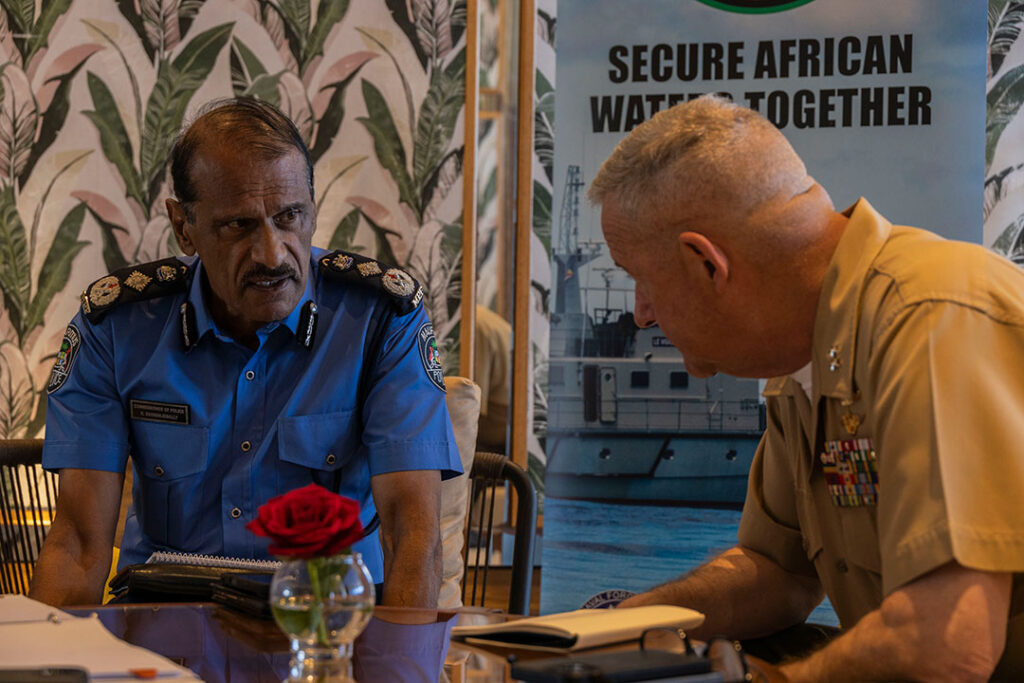About 80% of the world’s oil trade moves through the Western Indian Ocean, which faces escalating maritime threats, including attacks on shipping; illicit trafficking; illegal, unreported and unregulated (IUU) fishing; piracy; and terrorism. These challenges pose broader threats to regional and global security.
Against this backdrop, the third annual Africa Maritime Forces Summit (AMFS) was held June 23-27 in Mauritius. The event attracted military and government leaders from 45 nations.
“This summit is an opportunity for all the maritime forces, especially from Africa,” Mauritania Navy Master Chief Petty Officer El Kentoaui Mohamed said. “Thanks to this summit, we’ve had very successful networking, and we’ve built up ties with other member states. So, going forward to finding solutions will be easier because we are now in touch with one another.”
The summit’s agenda focused on enhancing maritime domain awareness and strengthening cooperation through frameworks such as the Regional Coordination Operations Centre (RCOC) in Seychelles, the Regional Maritime Information Fusion Centre (RMIFC) in Madagascar and the Combined Maritime Forces.
The RCOC and RMIFC share information with each another and any country facing a maritime threat. Their information often helps local, regional and international allies collaborate on at-sea arrests. If a threatened country is not able to interdict, it can request help from the RCOC, which coordinates operations to counter sea crimes for 21 countries.
AMFS featured expert-led panel discussions that focused on regional maritime threats, the importance of interconnected oceans, and the development of effective, collaborative maritime security mechanisms. These discussions emphasized the harmful effects that piracy, illegal fishing, and trafficking have on regional security and global stability.
There were eight piracy incidents reported in the Western Indian Ocean and Gulf of Aden last year, up from five in 2023. Pirates often use hijacked fishing vessels to attack other ships. The threat shows no signs of waning, as Yemen’s Houthi rebels have begun supplying Somalia’s al-Shabaab terror group with weapons and technical assistance in return for ramping up piracy and ransom kidnappings in the Gulf of Aden and off Somalia’s coast.
IUU fishing, often by foreign industrial trawlers, drives food insecurity, devastates marine ecosystems and threatens the livelihoods of artisanal fishing communities. Tanzania loses about $400 million annually to the scourge, which often is linked to other sea crimes, such as human, weapons and drug trafficking.
An objective of the summit was to help develop a unified, effective regional maritime security system. It included a series of bilateral engagements and specialized working groups designed to translate high-level policy dialogue into mission-ready initiatives. The summit also included key leader engagements that aimed to identify practical, collaborative solutions to strengthen maritime governance and counter shared threats.
Mozambique Navy Rear Adm. Eugenio Muatuca said the summit helped countries learn new approaches to an array of challenges.
“The cooperation with the U.S., actually, is an example of the promotion of good governance of the seas,” Muatuca said. “This example serves for the development of our countries, amongst them the development of the Navy. This is also a moment for us to share information inherent to the capacities of our forces. … We build capacity so the Navy of Mozambique can also partake in [addressing] the global challenges that we have.”
Leaders also discussed regional logistics and disaster response.
“The presence of 45 nations at this year’s African Maritime Forces Summit reflected a shared understanding that the maritime security challenges we face in this region have global impacts and demand collective action,” Adm. Stuart B. Munsch, commander of NAVEUR/NAVAF, said in a news release. “This summit represented the shared commitment of all represented nations in securing the African maritime domain, which underpins international stability, economic development and the rule of law.”
This year’s summit coincided with the Africa Senior Enlisted Leaders Conference. Held in Morocco, the conference included military leaders from 29 African and NATO nations who exchanged information about military education and training and discussed opportunities for further collaboration.

